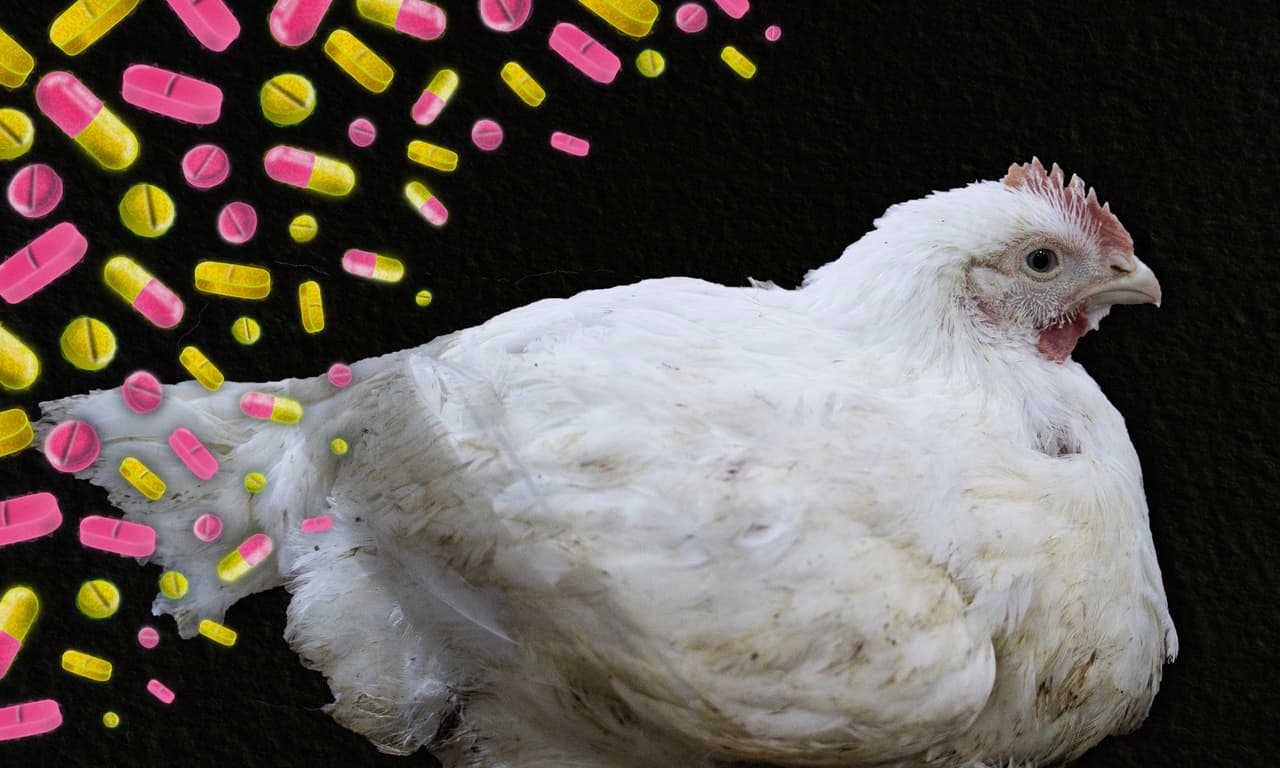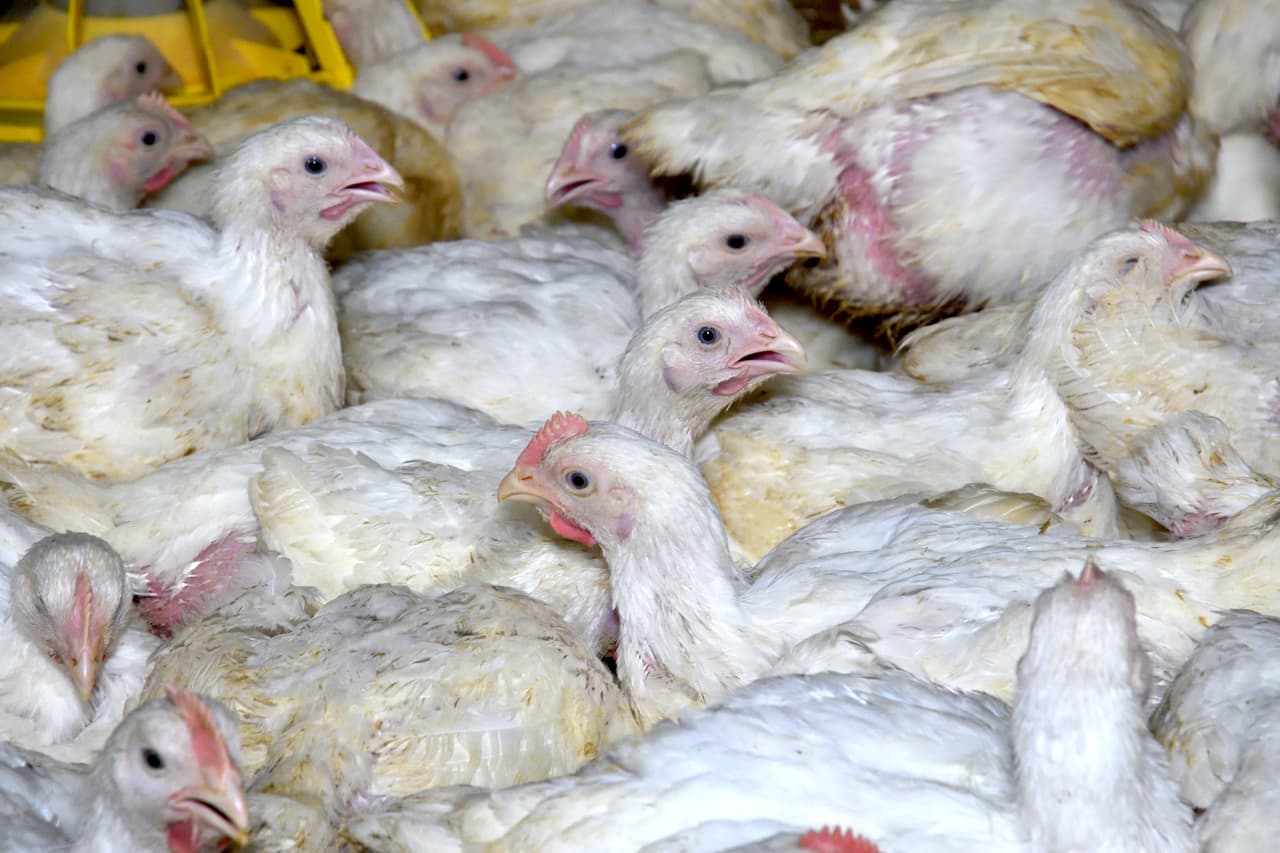
Dangerous salmonella found in UK farms and meat
A dangerous strain of salmonella is becoming more common in meat in the UK, unpublished government records show.
Test results obtained by the Bureau of Investigative Journalism and the Guardian reveal a spike in poultry products contaminated with salmonella infantis in recent years, with both raw meat and processed chicken found to be affected. Beef, pork and animal feed have also tested positive for the disease, which can cause serious illness and sometimes proves fatal.
Some of the products were contaminated by antibiotic-resistant infections, meaning treatment options for anyone becoming seriously ill could be reduced. Such “superbug” variants, known as multidrug resistant (MDR) salmonella infantis, have been linked to major food poisoning outbreaks, including one in the US in which at least one person died.
Although some of the contaminated meat originated from outside the UK, the Bureau has learnt that salmonella infantis has been found on UK poultry farms, suggesting the disease may have taken hold within the country.
Salmonella bacteria are found in the guts of poultry and livestock. Birds and animals can be infected through feed, in hatcheries, or through faeces on the way to abattoirs, where slaughter and processing can also spread the infection.
Salmonella poisoning can be life-threatening, particularly for infants and the elderly. Although most people will recover without the need for antibiotics, they are often recommended in the most serious cases.
There are more than 2,000 types of salmonella, and salmonella infantis is regarded as being among the most virulent, frequently causing illness in humans and spreading rapidly on farms. The strain has become well established in parts of the EU poultry industry, but has rarely been found on UK farms.
Animal health chiefs are concerned about any spread of the disease into the UK’s poultry industry, and have raised particular concerns about “superbug” strains, which are more deadly.
A report by the Animal and Plant Health Agency into salmonella infantis outbreaks on UK chicken farms warned that “once introduced within a country, the speed at which infantis spreads and establishes itself within the production chain of that country gives rise to great concern”.
The most recent public health data available for the UK suggests that around 400 people were infected with salmonella infantis in 2019 and 2020, although the true figure could be far higher as not every case is reported.

Responding to the investigation’s findings, Robin May, the chief scientific advisor of the Food Standards Agency, said: “The risk of people getting salmonella infections through handling and consuming contaminated meat, including breaded chicken products, is very low so long as good hygiene and cooking practices are followed.”
Richard Griffiths, chief executive of the British Poultry Council, said: “The prevalence and type of salmonella in livestock changes over time and with varying environments, which is why the monitoring programmes are in place. The on-farm monitoring has clearly worked in these instances and the information from them can be used to develop control plans as required.”
Internal documents released after freedom of information requests to Northern Ireland’s Department of Agriculture, Environment and Rural Affairs (Daera) reveal that tests on meat products and other commodities detected salmonella infantis on at least 114 occasions since 2016.
Raw poultry meat was the most commonly contaminated product with a steep rise in detections recorded in 2020 and 2021. Raw pork and beef meat was also found to be infected, as was grain used as livestock feed. UK government records show processed chicken products, including goujons and kievs, were also found to be contaminated in Northern Ireland.
Separate internal Daera records seen by the Bureau reveal that some of the contaminated meat and feed contained antibiotic resistant strains of salmonella infantis. In 2020, nine contaminated poultry products and one pork item were confirmed as harbouring multidrug resistant salmonella infantis, along with one feed product.
In a statement, Daera confirmed there had been an increase in salmonella infantis detected in 2020 and said it was “concerned about the increase … across Europe over the last decade and particularly the levels of antimicrobial resistance it displays. Officials will continue to monitor this situation and take action as required.”
It added that the majority of cases were connected to imported meat.
Superbug variants of salmonella were also found during separate UK-wide tests conducted by the Food Standards Agency in 2021, including in two supermarket chicken goujon products.
In many of these cases, the contaminated products showed partial or full resistance to ciprofloxacin, a fluoroquinolone antibiotic that is often used to treat serious food poisoning. Fluoroquinolones were once widely used on UK chicken farms and are still used in poultry production internationally.
Cóilín Nunan, a scientific advisor to the Alliance to Save Antibiotics, said it was “particularly alarming that 70% of the isolates found have intermediate or full resistance to fluoroquinolone antibiotics”. He added: “Fluoroquinolones are highest priority, critically important antibiotics which are key treatments for serious salmonella infections.”
The records do not show the origin of all the contaminated meat and feed samples, stating they included both the UK and other countries, but Ireland and Hungary were referred to.
The Bureau has learnt that salmonella infantis, including superbug variants, was found on four occasions on poultry farms in Northern Ireland in 2019 and 2020, and at least five times on chicken farms in England and Wales since 2013, including twice in Herefordshire in 2021. In one of the Herefordshire cases, the detection prompted the culling of more than 100,000 infected chickens.
In Northern Ireland, however, it appears no birds were destroyed, meaning infected products were free to be sold.
“When salmonella infantis was isolated, a public health advisory letter was issued to the flock keeper,” Daera documents state. “The flocks and any associated products were not placed under restriction. Advice was given on control and elimination of infection.”
Unlike several other strains of salmonella known to pose a potential public health risk, salmonella infantis in the UK is not regarded as a “regulated” strain of the disease in meat chickens, meaning there is no legal requirement for infected birds to be destroyed. Instead, records show, “attempts are made to manage [cases] in a similar manner to the regulated [strains] but on a voluntary basis”.
Nunan said that salmonella infantis “can cause serious infections in humans, so these bacteria should not be allowed to spread uncontrolled in the food chain”.
Daera said the salmonella infantis cases found in poultry flocks in 2020 and 2019 “had a different AMR resistance profile to isolates originating from Europe and have not been associated with the large human outbreaks that have been reported in parts of Europe”.
The wide use of antibiotics in farming, particularly on intensive pig and poultry operations, can create incubators for deadly drug-resistant diseases. The UK poultry industry has significantly cut its annual usage of antibiotics in the past decade after concerns about the spread of antibiotic-resistant bacteria. It is considered one of the world’s biggest public health threats; a major UK government review estimated that superbugs kill 700,000 people worldwide a year.
Header image: A chicken at a factory farm. Credit: Animal Equality International
Reporters: Andrew Wasley and Susannah Savage
Impact producer: Grace Murray
Global editor: James Ball
Editor: Meirion Jones
Production editors: Frankie Goodway and Emily Goddard
Fact checker: Alice Milliken
Legal team: Stephen Shotnes (Simons Muirhead Burton)
Our reporting on antimicrobial resistance is part of our Environment project, which has several funders. None of our funders have any influence over the Bureau’s editorial decisions or output
-
Area:
-
Subject:



